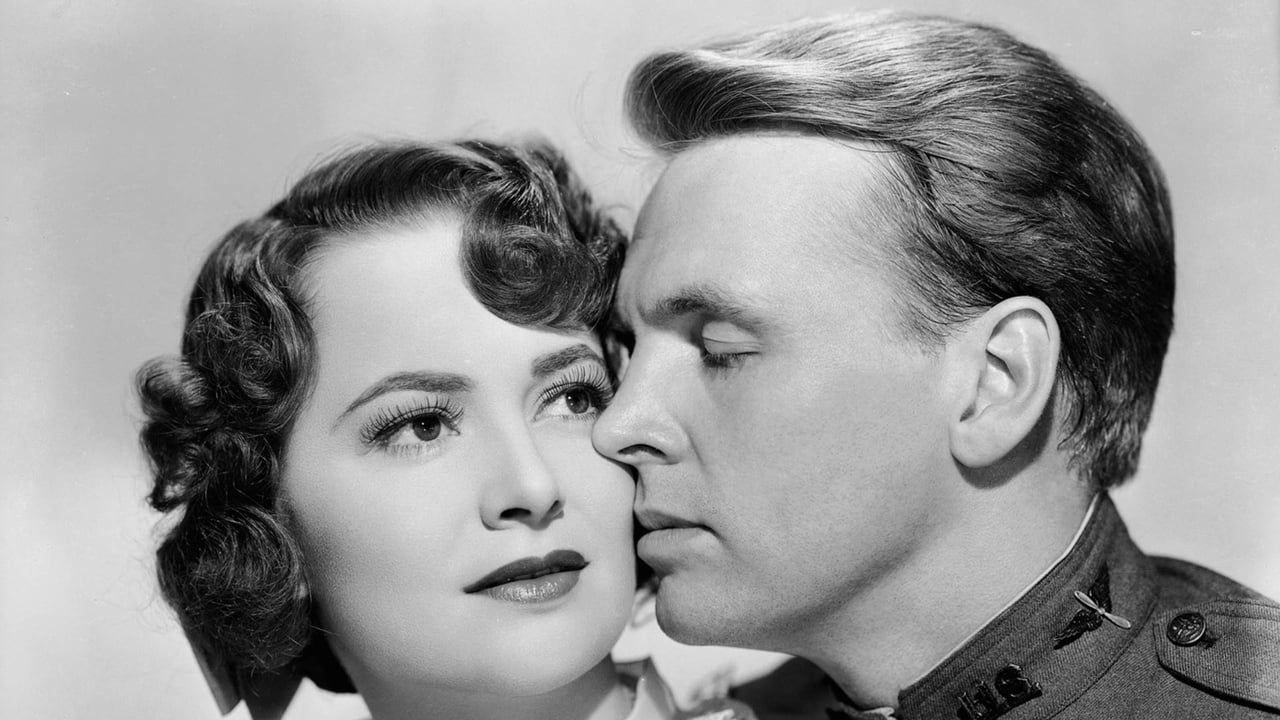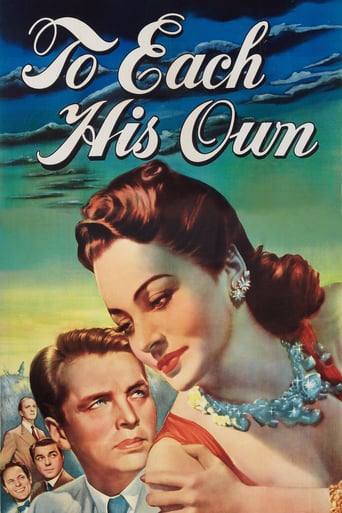

A successful cosmetics tycoon (Olivia de Havilland) goes on a flashback of her life story as she mans her assigned post during a bombing raid in 1944 London. This trip takes us to her youthful days as the beautiful daughter working in her father's pharmacy in small-town New York state where she's the prize for a couple of suitors, but falls for a barnstorming WWI pilot (John Lund) and ends up having a son out of wedlock. The prevailing morals make keeping the child out of the question, but her love for her son is at the center of the film, as is her emerging success as a businesswoman which allows her financial independence which opens more doors for her character. This role won de Havilland the Oscar for best actress and it is a great part which shows a woman taking on her times and succeeding in doing so.
... View MoreYes, this is a very effective melodrama, and yes, de Havilland deserved her Oscar, not only for her sincere performance at every point in the life of the character, but for her totally believable aging from 18 to middle age. At each step of the way she "evolves" the character into the appropriate age. A triumph of technique and sincerity.Seemingly no one in the world between 1939 and 2015 has ever noted that Brackett, for all his "original story" Oscar nom, totally stole the plot from Edith Wharton. Her novel, OLD NEW YORK, was made up of a series of novellas covering representative New York society from the 1840s onward. One of these, titled THE OLD MAID, became a play and then a 1939 film, starring Bette Davis and Miriam Hopkins.THE OLD MAID introduced the Civil War to explain the demise of its leading lady's love and father of her illegitimate child, in this case a girl. In the novella, he was simply a playboy, off to Paris for art and she a NY fling.TO EACH HIS OWN moves the "war" up to WWI, changes the sex of the child, and then blatantly goes on to ape Wharton and the prior film. The only difference is that in THE OLD MAID, the character was against her daughter's marriage, while in TO EACH HIS OWN, she is very much "for" it.It galls me that people get praise for copying other's creations, as it does me hear with Brackett. Even more galling is the short-term memory loss of Academy members. Only 7 years passed between the two films. Surely someone in the writing departments of voters could remember the Wharton plot.Rent or buy both films and run them close to each other, enjoying the obvious similarities.
... View MoreThis is another of those recipients of a top Oscar (in its case, Olivia De Havilland's first for Best Actress) which have unaccountably fallen through the cracks over the years; in fact, the copy I watched left much to be desired, and this prestigious Paramount effort does not even seem to have been released as a MOD DVD-R! Indeed, it was helmed by one of the studio's top directors, albeit starring an actress who had long been associated with one of its rivals i.e. Warner Bros. With this in mind, the film seemed very much in the vein of a typical vehicle Bette Davis (a De Havilland colleague) would make over there – in particular, it followed pretty much the same plot as THE OLD MAID (1939)! This neglect may have something to do with the fact that, not only was the star's second win – for William Wyler's Henry James adaptation (of "Washington Square") THE HEIRESS (1949) – a more substantial (or, if you like, contested) achievement but, that same year (1946), De Havilland would appear as twins in Robert Siodmak's classic noir THE DARK MIRROR, which the late eminent British film critic Leslie Halliwell eventually chose for the actress' rosette in his "Filmgoers' Companion"! Anyway, the plot (co-scripted by producer Charles Brackett – who received the film's other Oscar nod for Best Original Story) is not exactly compelling and fairly preposterous at times: De Havilland meets, is seduced and impregnated by dashing flier John Lund (in his debut and, curiously enough, amounting to a dual role) in one night; then, so as not to create a scandal in her small town, she tries to pass her offspring off as a foundling which is subsequently 'claimed' by a couple – the man involved having only married after the heroine rebuffed him – whose own baby has just died and left the mother grief-stricken! However, De Havilland keeps a close watch on her son by seeking to assist her former flame's wife; when the family's fortunes flounder but herself comes into big money – by taking over the cosmetics company set up by yet another bootlegging ex-beau(!) – she offers to bail them out as long as the child is returned to her. Still, her pampering is not enough to conquer his affections, and she has no option but to let him go! Years later, they are momentarily reunited in London (where he, whom Lund again incarnates, is about to be married) but a British lord – played by Roland Culver and who, like De Havilland, has known disillusion and loneliness – determines that the truth finally comes out...The handsomely mounted film is well served by the accustomed studio efficiency; De Havilland, only 30 when this was made, is most convincing as a woman who has sacrificed her youth and personal happiness for the sake of her (ungrateful) flesh and blood – in this respect, it does feel somewhat old-fashioned, considering that it offers nothing new from the standard "Madame X" formula. Incidentally, while rated a respectable ** in the afore-mentioned "Leslie Halliwell Film Guide", it is erroneously listed therein as running 100 minutes – when the movie's official duration is well over that length, at a hefty (if not overly tiresome) 122!
... View MoreAlthough I don't think To Each His Own is as good as Olivia DeHavilland's other Oscar winner The Heiress or as good as the film she lost for in between these two, The Snake Pit, To Each His Own was the film that Olivia finally came into her own as an actress. She also showed Jack Warner a thing or two about type casting.The story of To Each His Own is very much like something that Olivia's friend from Warner Brothers, Bette Davis, might have done. Bette won and was nominated multiple times for films like these and it's the stuff that Olivia badly wanted to do and was thwarted by Jack Warner who could only see her as the clinging leading lady to some dashing hero like Errol Flynn.This film is all Olivia and she's the right age to do it. She was 30 at the time she made To Each His Own and the part called for her to age from her Twneties to her Forties. When we first meet her she's a a rather unhappy middle aged spinster doing duty as an air raid warden in wartime London. She's an American expatriate who is a cosmetics queen though her factory has now been converted to war use. She meets up with dashing Roland Culver who's a titled earl doing the same work and her thoughts go back to her years as a kid during that first World War.A romance with a dashing flier played by John Lund and she's left pregnant and no chance of married when he's killed in action. Illegitimate birth was a horrible situation back in the day, so Olivia gives up the child to friends Philip Terry and Mary Anderson. Still the maternal instincts can't be snuffed out and she intrudes in their lives as well as a friend of the family her own child refers to as an 'aunt'.Of course the whole thing becomes impossible and Olivia eventually moves to London when her factory becomes British based. Still she never stops thinking about the child someone else is raising.Playing Josephine Norris as a young girl was no stretch because that's what she was playing all those years at Warner Brothers. But the more difficult challenge and what got her the Oscar for Best Actress was the way Mitchell Leisen guided her through the many stages of life. That called for Olivia to draw from the wellsprings of talent and ability that she knew she had and couldn't convince Jack Warner of the same.The film was aided at the box office by the popularity of the song To Each His Own. You will not hear a note of it in the film, but The Ink Spots and Tony Martin had best selling records that year, The Ink Spots version going to number one on that Hit Parade that Lucky Strike sponsored. In fact I'm sure the popularity of the song and the film aided each other.To Each His Own also earned an Academy Award nomination for Charles Brackett for Best Original Story.You watch this film and you wonder just what Jack Warner must have been thinking when Olivia DeHavilland's name was announced on Oscar night.
... View More